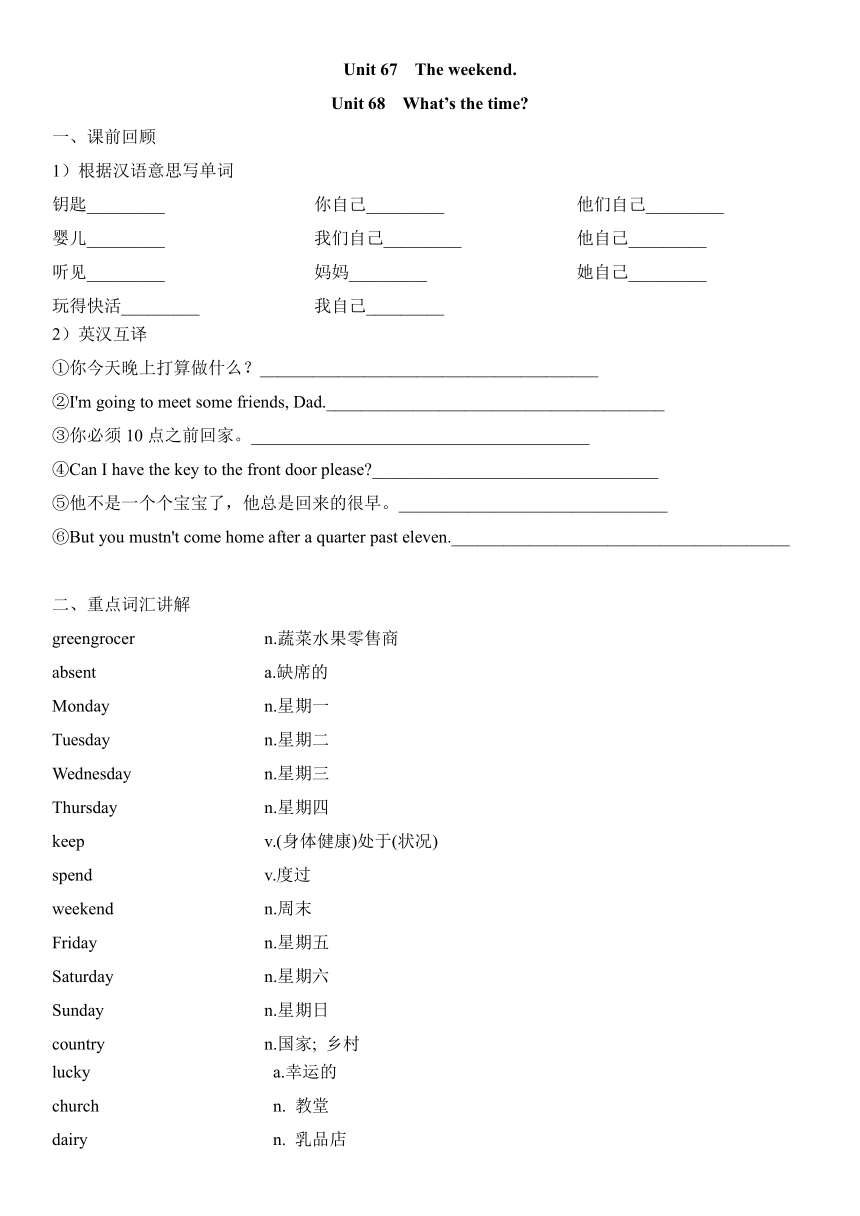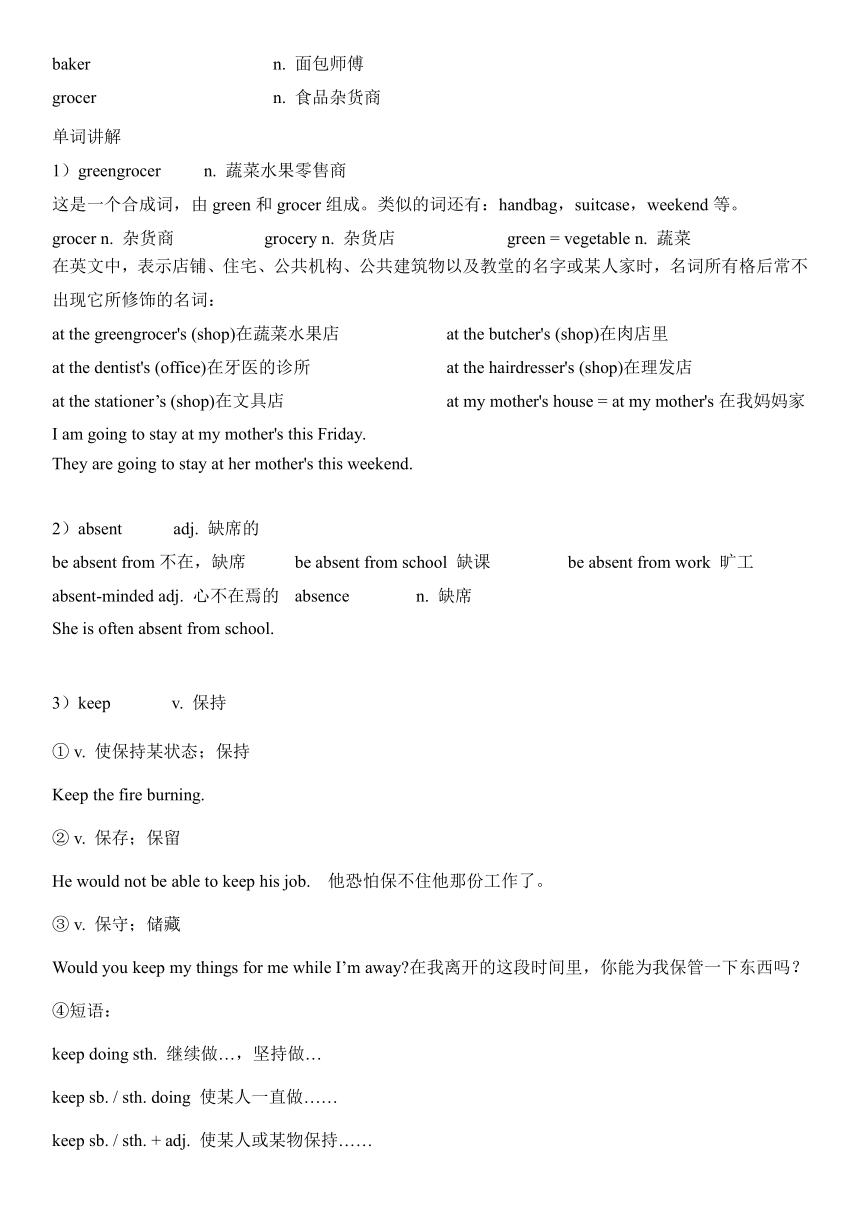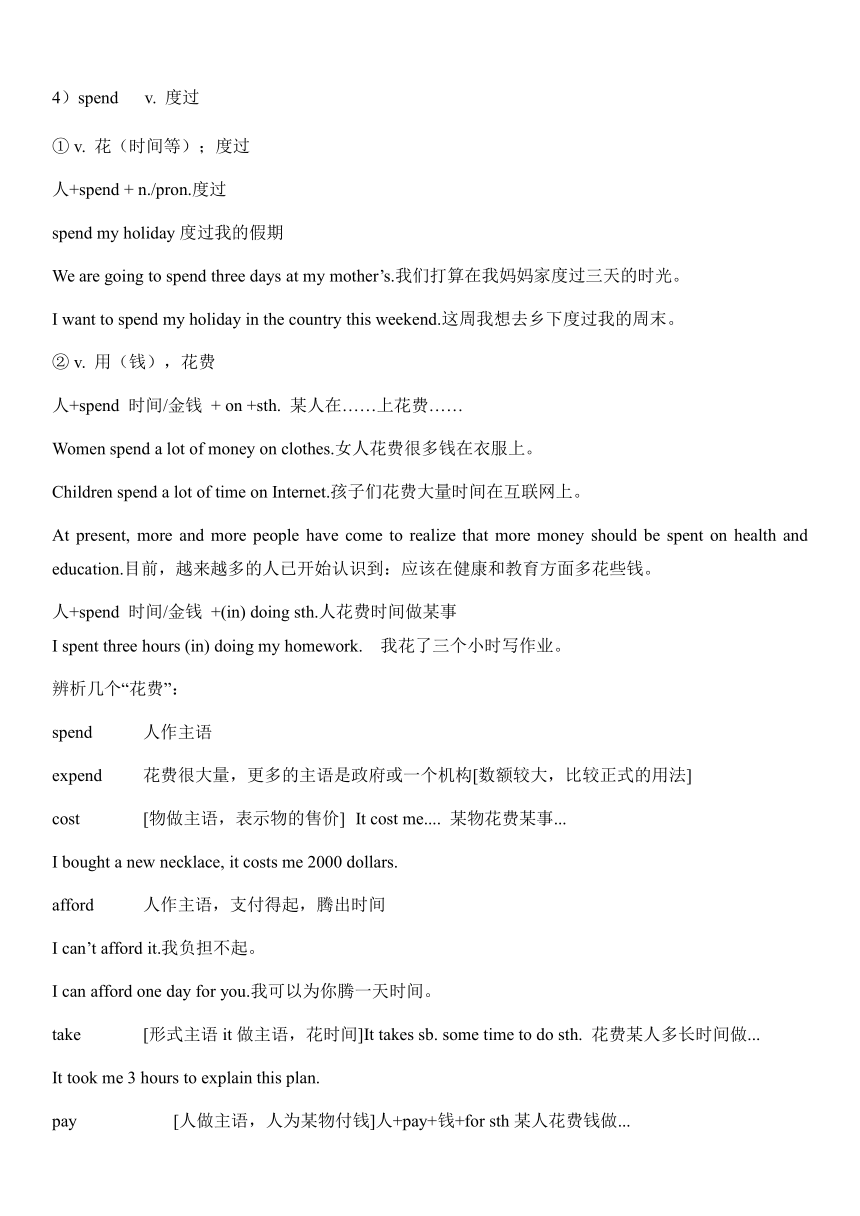新概念英语第一册Lessons67-68讲义
文档属性
| 名称 | 新概念英语第一册Lessons67-68讲义 |  | |
| 格式 | docx | ||
| 文件大小 | 23.8KB | ||
| 资源类型 | 教案 | ||
| 版本资源 | 新概念英语 | ||
| 科目 | 英语 | ||
| 更新时间 | 2024-04-28 17:24:27 | ||
图片预览



文档简介
Unit 67 The weekend.
Unit 68 What’s the time
一、课前回顾
1)根据汉语意思写单词
钥匙_________
婴儿_________
听见_________
玩得快活_________
你自己_________
我们自己_________
妈妈_________
我自己_________
他们自己_________
他自己_________
她自己_________
2)英汉互译
①你今天晚上打算做什么?_______________________________________
②I'm going to meet some friends, Dad._______________________________________
③你必须10点之前回家。_______________________________________
④Can I have the key to the front door please _________________________________
⑤他不是一个个宝宝了,他总是回来的很早。_______________________________
⑥But you mustn't come home after a quarter past eleven._______________________________________
二、重点词汇讲解
greengrocer n.蔬菜水果零售商
absent a.缺席的
Monday n.星期一
Tuesday n.星期二
Wednesday n.星期三
Thursday n.星期四
keep v.(身体健康)处于(状况)
spend v.度过
weekend n.周末
Friday n.星期五
Saturday n.星期六
Sunday n.星期日
country n.国家; 乡村
lucky a.幸运的
church n. 教堂
dairy n. 乳品店
baker n. 面包师傅
grocer n. 食品杂货商
单词讲解
1)greengrocer n. 蔬菜水果零售商
这是一个合成词,由green和grocer组成。类似的词还有:handbag,suitcase,weekend等。
grocer n. 杂货商 grocery n. 杂货店 green = vegetable n. 蔬菜
在英文中,表示店铺、住宅、公共机构、公共建筑物以及教堂的名字或某人家时,名词所有格后常不出现它所修饰的名词:
at the greengrocer's (shop)在蔬菜水果店 at the butcher's (shop)在肉店里
at the dentist's (office)在牙医的诊所 at the hairdresser's (shop)在理发店
at the stationer’s (shop)在文具店 at my mother's house = at my mother's在我妈妈家
I am going to stay at my mother's this Friday.
They are going to stay at her mother's this weekend.
2)absent adj. 缺席的
be absent from不在,缺席 be absent from school 缺课 be absent from work 旷工
absent-minded adj. 心不在焉的 absence n. 缺席
She is often absent from school.
3)keep v. 保持
① v. 使保持某状态;保持
Keep the fire burning.
② v. 保存;保留
He would not be able to keep his job. 他恐怕保不住他那份工作了。
③ v. 保守;储藏
Would you keep my things for me while I’m away 在我离开的这段时间里,你能为我保管一下东西吗?
④短语:
keep doing sth. 继续做…,坚持做…
keep sb. / sth. doing 使某人一直做……
keep sb. / sth. + adj. 使某人或某物保持……
4)spend v. 度过
① v. 花(时间等);度过
人+spend + n./pron.度过
spend my holiday度过我的假期
We are going to spend three days at my mother’s.我们打算在我妈妈家度过三天的时光。
I want to spend my holiday in the country this weekend.这周我想去乡下度过我的周末。
② v. 用(钱),花费
人+spend 时间/金钱 + on +sth. 某人在……上花费……
Women spend a lot of money on clothes.女人花费很多钱在衣服上。
Children spend a lot of time on Internet.孩子们花费大量时间在互联网上。
At present, more and more people have come to realize that more money should be spent on health and education.目前,越来越多的人已开始认识到:应该在健康和教育方面多花些钱。
人+spend 时间/金钱 +(in) doing sth.人花费时间做某事
I spent three hours (in) doing my homework. 我花了三个小时写作业。
辨析几个“花费”:
spend 人作主语
expend 花费很大量,更多的主语是政府或一个机构[数额较大,比较正式的用法]
cost [物做主语,表示物的售价] It cost me.... 某物花费某事...
I bought a new necklace, it costs me 2000 dollars.
afford 人作主语,支付得起,腾出时间
I can’t afford it.我负担不起。
I can afford one day for you.我可以为你腾一天时间。
take [形式主语it做主语,花时间]It takes sb. some time to do sth. 花费某人多长时间做...
It took me 3 hours to explain this plan.
pay [人做主语,人为某物付钱]人+pay+钱+for sth某人花费钱做...
5)country n. 乡村
① n. 国家;国土;故乡
India, a former British colony, is now a fully independent country.曾一度为英国殖民地的印度如今已是一个完全独立的国家。
② n. 乡下,乡村
the country = the countryside 乡下
country表示“农村”时,前面一定要加定冠词the。
③ adj. 乡下的;乡村风味的
I prefer country life to life in the city.乡村生活与城市生活相比,我更喜欢乡村生活。
After nearly thirty years in the city, he’s still country.他在城里住了将近三十年,可还是土气十足。
6)weekend n. 周末
at the weekend 在周末 weekday 平日(除了周六和周日)
7)lucky adj. 幸运的
① adj. 有好运的,幸运的
She was lucky to get such a well-paid job.她能得到这样一个报酬优厚的工作真幸运。
② adj. 侥幸的,碰巧的
He didn’t really know the answer - it was just a lucky guess.他并非真知道答案,那不过是个侥幸的猜测。
It’s lucky he’s here.他碰巧在这儿。
拓展:luck n. 运气 luckily adv. 幸运地 unlucky adj. 不幸的,倒霉的
unluckily adv. 倒霉地 by pure luck纯粹靠运气 try one’s luck试试某人的运气
lucky dog 幸运儿 good luck好运 have no luck没有运气
8)church n. 教堂
go to church 去做礼拜 go to the church 去教堂 at church 做礼拜
三、课文及讲解
MRS.JOHNSON: Hello. Were you at the butcher's
MRS.WILLIAMS: Yes, I was. Were you at the butcher's, too
MRS.JOHNSON: No, I wasn't.
I was at the greengrocer's.
How's Jimmy today
MRS.WILLIAMS: He's very well, thank you.
MRS.JOHNSON: Was he absent from school last week
MRS.WILLIAMS: Yes, he was.
He was absent on Monday, Tuesday, Wednesday and Thursday.
MRS.WILLIAMS: How are you all keeping
MRS.JOHNSON: Very well, thank you.
We're going to spend three days in the country.
We're going to stay at my mother's for the weekend.
MRS.WILLIAMS: Friday, Saturday and Sunday in the country!
Aren't you lucky!
课文讲解
1)Hello. Were you at the butcher's Yes, I was. Were you at the butcher's, too No, I wasn't.I was at the greengrocer's.How's Jimmy today
①此句是一般过去时的一般疑问句形式。
②at the butcher’s 表示“在肉店”,相当于at the butcher’s shop。在英语中,表示店铺、住宅、公共机构、公共建筑物以及教堂或某人家时,名词所有格后常不出现它所修饰的名词
2)He's very well, thank you.Was he absent from school last week Yes, he was.He was absent on Monday,
Tuesday, Wednesday and Thursday.
①此句中well 指身体好,身体健康的,相当于fine
②be absent from缺席...
3)How are you all keeping Very well, thank you.We're going to spend three days in the country.We're going to stay at my mother's for the weekend.
①How are you all keeping 这是一句口语的问候身体常用句型,相当于How are you / How are you doing 你好吗?
②be going to do 打算做某事。
③for the weekend 介词短语,表示目的。for“为了”。
for the weekend 整个周末这几天时间 at the weekend 强调时间的某一点
4)Friday, Saturday and Sunday in the country!Aren't you lucky!
①本句为否定疑问句。可以表示说话者惊异的情绪、责难的口吻或赞许;也可表示说话者的某种建议、邀请、请求或看法等。
②lucky 幸运的,我们在口语中经常听到:You are such a lucky dog. 你真是个幸运儿。其反义词是unlucky。其名词形式是luck:Good luck! 祝你好运!
四、重要语法
一般过去时(一)
1)定义:描述过去的事实或状态,描述过去的动作。在英语中,非现在的以前都叫过去。过去发生的而现在已经结束的动作要用一般过去时来表示。
①表示过去某个点上特定的时间存在的状态,事实,或发生的动作。
②表示在过去的一段时间内经常发生的动作或反复的习惯。
2)含有be动词的一般过去时:一般过去时的谓语部分构成为动词的过去式形式。be动词的过去式形式时不规则变化:
am, is — was 否定形式:wasn’t
are — were 否定形式:weren’t
I / he / she / it 与was / wasn’t 连用;we / you / they 与were / weren’t 连用
3)句子结构:
肯定句:主语+was/ were/+其他
否定句:S+ wasn’t/ weren’t+其他
一般疑问句:Was/ Were+ 主语+ …
Were you at school or at church on January 1st 1月1号你在学校还是上教堂了?
I was at school on January 1st. I was at church. 我1月1号没上学。我上教堂做礼拜了。
When was he absent from school 他何时缺课?
He was not absent on Monday, Tuesday, Wednesday and Thursday. 他周一、周二、周三和周四没有缺课了。
否定疑问句:
否定疑问句表示双重肯定,表示说话者惊异的情绪、责难的口吻或赞叹;也可表示说话者的某种建议、邀请、请求或看法等。
Haven’t I asked you 难道我没问过你吗?
Aren’t you a student 难道你不是学生吗?
Can’t you wait a moment 你不能等一会儿吗?
回答这种问题这种问题时用简略回答。如果答语是肯定的,就用Yes;如果答语是否定的,就用No。但答语的汉语译法有特殊之处。
--Don’t you know English ---Yes, I do.不,我懂。
Unit 68 What’s the time
一、课前回顾
1)根据汉语意思写单词
钥匙_________
婴儿_________
听见_________
玩得快活_________
你自己_________
我们自己_________
妈妈_________
我自己_________
他们自己_________
他自己_________
她自己_________
2)英汉互译
①你今天晚上打算做什么?_______________________________________
②I'm going to meet some friends, Dad._______________________________________
③你必须10点之前回家。_______________________________________
④Can I have the key to the front door please _________________________________
⑤他不是一个个宝宝了,他总是回来的很早。_______________________________
⑥But you mustn't come home after a quarter past eleven._______________________________________
二、重点词汇讲解
greengrocer n.蔬菜水果零售商
absent a.缺席的
Monday n.星期一
Tuesday n.星期二
Wednesday n.星期三
Thursday n.星期四
keep v.(身体健康)处于(状况)
spend v.度过
weekend n.周末
Friday n.星期五
Saturday n.星期六
Sunday n.星期日
country n.国家; 乡村
lucky a.幸运的
church n. 教堂
dairy n. 乳品店
baker n. 面包师傅
grocer n. 食品杂货商
单词讲解
1)greengrocer n. 蔬菜水果零售商
这是一个合成词,由green和grocer组成。类似的词还有:handbag,suitcase,weekend等。
grocer n. 杂货商 grocery n. 杂货店 green = vegetable n. 蔬菜
在英文中,表示店铺、住宅、公共机构、公共建筑物以及教堂的名字或某人家时,名词所有格后常不出现它所修饰的名词:
at the greengrocer's (shop)在蔬菜水果店 at the butcher's (shop)在肉店里
at the dentist's (office)在牙医的诊所 at the hairdresser's (shop)在理发店
at the stationer’s (shop)在文具店 at my mother's house = at my mother's在我妈妈家
I am going to stay at my mother's this Friday.
They are going to stay at her mother's this weekend.
2)absent adj. 缺席的
be absent from不在,缺席 be absent from school 缺课 be absent from work 旷工
absent-minded adj. 心不在焉的 absence n. 缺席
She is often absent from school.
3)keep v. 保持
① v. 使保持某状态;保持
Keep the fire burning.
② v. 保存;保留
He would not be able to keep his job. 他恐怕保不住他那份工作了。
③ v. 保守;储藏
Would you keep my things for me while I’m away 在我离开的这段时间里,你能为我保管一下东西吗?
④短语:
keep doing sth. 继续做…,坚持做…
keep sb. / sth. doing 使某人一直做……
keep sb. / sth. + adj. 使某人或某物保持……
4)spend v. 度过
① v. 花(时间等);度过
人+spend + n./pron.度过
spend my holiday度过我的假期
We are going to spend three days at my mother’s.我们打算在我妈妈家度过三天的时光。
I want to spend my holiday in the country this weekend.这周我想去乡下度过我的周末。
② v. 用(钱),花费
人+spend 时间/金钱 + on +sth. 某人在……上花费……
Women spend a lot of money on clothes.女人花费很多钱在衣服上。
Children spend a lot of time on Internet.孩子们花费大量时间在互联网上。
At present, more and more people have come to realize that more money should be spent on health and education.目前,越来越多的人已开始认识到:应该在健康和教育方面多花些钱。
人+spend 时间/金钱 +(in) doing sth.人花费时间做某事
I spent three hours (in) doing my homework. 我花了三个小时写作业。
辨析几个“花费”:
spend 人作主语
expend 花费很大量,更多的主语是政府或一个机构[数额较大,比较正式的用法]
cost [物做主语,表示物的售价] It cost me.... 某物花费某事...
I bought a new necklace, it costs me 2000 dollars.
afford 人作主语,支付得起,腾出时间
I can’t afford it.我负担不起。
I can afford one day for you.我可以为你腾一天时间。
take [形式主语it做主语,花时间]It takes sb. some time to do sth. 花费某人多长时间做...
It took me 3 hours to explain this plan.
pay [人做主语,人为某物付钱]人+pay+钱+for sth某人花费钱做...
5)country n. 乡村
① n. 国家;国土;故乡
India, a former British colony, is now a fully independent country.曾一度为英国殖民地的印度如今已是一个完全独立的国家。
② n. 乡下,乡村
the country = the countryside 乡下
country表示“农村”时,前面一定要加定冠词the。
③ adj. 乡下的;乡村风味的
I prefer country life to life in the city.乡村生活与城市生活相比,我更喜欢乡村生活。
After nearly thirty years in the city, he’s still country.他在城里住了将近三十年,可还是土气十足。
6)weekend n. 周末
at the weekend 在周末 weekday 平日(除了周六和周日)
7)lucky adj. 幸运的
① adj. 有好运的,幸运的
She was lucky to get such a well-paid job.她能得到这样一个报酬优厚的工作真幸运。
② adj. 侥幸的,碰巧的
He didn’t really know the answer - it was just a lucky guess.他并非真知道答案,那不过是个侥幸的猜测。
It’s lucky he’s here.他碰巧在这儿。
拓展:luck n. 运气 luckily adv. 幸运地 unlucky adj. 不幸的,倒霉的
unluckily adv. 倒霉地 by pure luck纯粹靠运气 try one’s luck试试某人的运气
lucky dog 幸运儿 good luck好运 have no luck没有运气
8)church n. 教堂
go to church 去做礼拜 go to the church 去教堂 at church 做礼拜
三、课文及讲解
MRS.JOHNSON: Hello. Were you at the butcher's
MRS.WILLIAMS: Yes, I was. Were you at the butcher's, too
MRS.JOHNSON: No, I wasn't.
I was at the greengrocer's.
How's Jimmy today
MRS.WILLIAMS: He's very well, thank you.
MRS.JOHNSON: Was he absent from school last week
MRS.WILLIAMS: Yes, he was.
He was absent on Monday, Tuesday, Wednesday and Thursday.
MRS.WILLIAMS: How are you all keeping
MRS.JOHNSON: Very well, thank you.
We're going to spend three days in the country.
We're going to stay at my mother's for the weekend.
MRS.WILLIAMS: Friday, Saturday and Sunday in the country!
Aren't you lucky!
课文讲解
1)Hello. Were you at the butcher's Yes, I was. Were you at the butcher's, too No, I wasn't.I was at the greengrocer's.How's Jimmy today
①此句是一般过去时的一般疑问句形式。
②at the butcher’s 表示“在肉店”,相当于at the butcher’s shop。在英语中,表示店铺、住宅、公共机构、公共建筑物以及教堂或某人家时,名词所有格后常不出现它所修饰的名词
2)He's very well, thank you.Was he absent from school last week Yes, he was.He was absent on Monday,
Tuesday, Wednesday and Thursday.
①此句中well 指身体好,身体健康的,相当于fine
②be absent from缺席...
3)How are you all keeping Very well, thank you.We're going to spend three days in the country.We're going to stay at my mother's for the weekend.
①How are you all keeping 这是一句口语的问候身体常用句型,相当于How are you / How are you doing 你好吗?
②be going to do 打算做某事。
③for the weekend 介词短语,表示目的。for“为了”。
for the weekend 整个周末这几天时间 at the weekend 强调时间的某一点
4)Friday, Saturday and Sunday in the country!Aren't you lucky!
①本句为否定疑问句。可以表示说话者惊异的情绪、责难的口吻或赞许;也可表示说话者的某种建议、邀请、请求或看法等。
②lucky 幸运的,我们在口语中经常听到:You are such a lucky dog. 你真是个幸运儿。其反义词是unlucky。其名词形式是luck:Good luck! 祝你好运!
四、重要语法
一般过去时(一)
1)定义:描述过去的事实或状态,描述过去的动作。在英语中,非现在的以前都叫过去。过去发生的而现在已经结束的动作要用一般过去时来表示。
①表示过去某个点上特定的时间存在的状态,事实,或发生的动作。
②表示在过去的一段时间内经常发生的动作或反复的习惯。
2)含有be动词的一般过去时:一般过去时的谓语部分构成为动词的过去式形式。be动词的过去式形式时不规则变化:
am, is — was 否定形式:wasn’t
are — were 否定形式:weren’t
I / he / she / it 与was / wasn’t 连用;we / you / they 与were / weren’t 连用
3)句子结构:
肯定句:主语+was/ were/+其他
否定句:S+ wasn’t/ weren’t+其他
一般疑问句:Was/ Were+ 主语+ …
Were you at school or at church on January 1st 1月1号你在学校还是上教堂了?
I was at school on January 1st. I was at church. 我1月1号没上学。我上教堂做礼拜了。
When was he absent from school 他何时缺课?
He was not absent on Monday, Tuesday, Wednesday and Thursday. 他周一、周二、周三和周四没有缺课了。
否定疑问句:
否定疑问句表示双重肯定,表示说话者惊异的情绪、责难的口吻或赞叹;也可表示说话者的某种建议、邀请、请求或看法等。
Haven’t I asked you 难道我没问过你吗?
Aren’t you a student 难道你不是学生吗?
Can’t you wait a moment 你不能等一会儿吗?
回答这种问题这种问题时用简略回答。如果答语是肯定的,就用Yes;如果答语是否定的,就用No。但答语的汉语译法有特殊之处。
--Don’t you know English ---Yes, I do.不,我懂。
同课章节目录
